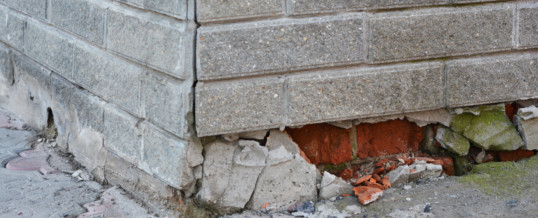
Are you curious to see whether or not your home has ongoing foundation issues? Do you suspect that the foundation of your house is worsening by the day? If so, then you’ll want to look at it more in-depth.
Fortunately, there are several telltale signs that you can use as an indication of home foundation issues, such as home foundation cracks. These cracks show that your home’s structure is on the move at the very least.
See below for all the signs of home foundation cracks and how they relate to your foundation as a whole. Be sure to use this information and promptly reach out to a professional.
1. Doors Are Getting Harder to Close
Have you noticed that closing your doors or windows is becoming increasingly more difficult? There’s a difference between a lock that doesn’t want to shut and a door that’s not closing because of other problems in the home.
If the foundation is to blame, then the door frame has become contorted due to the changes in your foundation. In time, closing your door will start to feel like trying to stick a square peg in a round hole.
For those of you that have noticed this trend, look around your door frame. If you can spot home foundation cracks around it, take it as a sign that you’re dealing with a shifting foundation.
If you aren’t currently dealing with this issue, you’re probably wondering how you can prevent it from happening. The answer is by waterproofing your basement. It will prevent water from shifting your foundation and causing other dilemmas.
2. Foundation Cracks
As the title of this article would imply, foundation cracks play a huge role in showing the current circumstance of your home’s condition.
Things such as cracks in your floors, walls, and chimney can show as proof that your home is moving frequently. You might also notice gaps that are becoming increasingly bigger.
Take the cracks that you find as an exterior warning of a much larger issue. If this movement continues, all of the sheetrock in your walls will start to break more and more.
Over time, these cracks can allow water and moisture to seep through. Thus creating a mold problem and harming the health of everyone in your family.
The second you notice foundation cracks are starting to form, be sure to reach out to a professional for advice. They can give you several recommendations on what your next steps should be.
3. Floors Are Beginning to Sag
You very well might take a walk around your home and not notice any signs of home foundation cracks. However, it’s not cause for celebration yet as there are other issues you might be dealing with.
If you notice that your floors are starting to sag or warp, then it’s a sign the foundation has moved. Don’t shrug it off as a mistake the builder made or chalk it up to the old age of your home, you’re dealing with a serious problem.
The sagging floor means that your foundation has moved so significantly that the support beams and walls have moved apart.
If the sag is significant, then be sure to contact a professional right away. If you aren’t sure whether it’s sagging or simply imbalanced, be sure to keep an eye on it. If the floor starts to sag more or is starting to slope, then be sure to contact a professional.
4. Floor Displacement
Perhaps your floor isn’t starting to sag—it’s starting to do just the opposite. Certain parts of your tile are protruding, your hardwood floors are rising, or your laminate is starting to bubble.
Whatever the case might be, it’s a sign that you have foundations issues. In this case, the distortion is likely being caused by soil and water that’s creeping under your floors and expanding.
Generally, you’d only see this activity under concrete, such as in your basement or your garage. However, there are times when it can do damage to your hallways bathroom floors, and the footing of your doorway as well.
No matter where it’s taking place, the rising of your surface means there’s moisture locked inside. If not properly dealt with, you’ll have a growing mold and mildew issue to go along with your foundation problems.
5. Musty Smell
As has been alluded to several times already, the cracks in your foundation can lead to moisture being locked inside and growing mold within your home.
However, there are some cases where you start to notice the smell of mold and mildew before you see visible home foundation cracks. If that’s the case, then you can expect to see the mold rather than the cracks.
If you spot mold in your house, grab a facemask before inspecting it further. Be sure to take notice of where the mold is growing as it will point you toward the culprit of your foundation issues.
Contact a professional right away and invest in a dehumidifier that you can use in the short term.
Fix Your Home Foundation Cracks Today
Now that you’ve seen the signs of home foundation issues, such as home foundation cracks, it’s clear that urgency is of the utmost importance.
Be sure to read this page for more information on foundation crack repair and why you need the touch of a professional.
For more inquiries, please feel free to reach out via our contact us page, and we’ll be happy to assist you further!
ShareAUG
